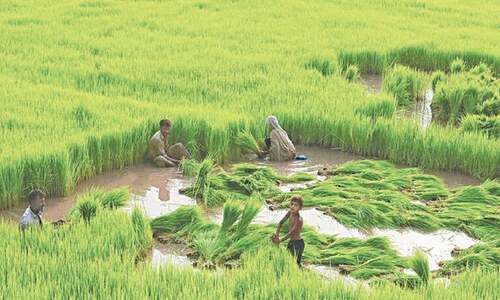By appointing most senior generals for the top military slots, Prime Minister Shehbaz’s government has put to rest unsettling speculations. The real test, however, is on the economic front. Much depends on handling the toxic mix of steep inflation and sagging growth.
The latest data tracks inflation at 30.1 per cent year-on-year. The World Bank projected a GDP growth rate of 2.0pc in the current fiscal ending in June 2023.
People aspire for jobs to support decent living standards. They are already on the edge of their wits struggling to make ends meet. Their frustration is compounded by watching harrowing images and hearing sad tales of homeless families in parts of flood-affected areas, threatened by want of very basic needs. The government will need to move swiftly and decisively to ease economic pressure on households and restore business confidence.
Responding to questions about what immediate steps are necessary for an economic turnaround and if nagging problems have mellowed Pakistanis’ romance with democracy, the concerned knowledgeable people hold mixed opinions.
Rising inequality, coexisting with symbols of huge wealth creation for a few, clearly needs a reorientation of policy in favour of the agricultural sector and SMEs
They acknowledged the peculiar severity of challenges exasperated by floods. The looming fear of global recession and the reluctance of donors and friendly nations to deliver on their commitments has not helped. Some feel struggling masses are too alienated to care for the government or its form, while others vouch for peoples’ continued preference for democracy even when imperfect.
Commenting, Syed Salim Raza, a former governor of the State Bank who sits on multiple boards and advisory forums, wanted the government to adopt a fact-based policy approach and desist from the temptation to act on whims.
“With the International Monetary Fund (IMF) review still pending, we have to wait and see what relief the government receives to cater for the impact of floods. There are previously agreed actions on imposition of general sales tax, etc, and new taxes to maintain the tax-to-GDP ratio, where GDP has risen because of rebasing and inflation. Some easing will allow the government to accommodate the pressure faced by the common man.
“Pakistan is likely to face import constraints for the medium term. The foreign exchange allocations will need to be based on a transparent formula instead of discretion. As neither the IMF nor the World Trade Organisation would want to see trade restrictions, the formula would need to be market-based with a clear termination date as conditions improve. Of paramount importance would be to give businesses clarity regarding import priorities”.
He did not expect people to lose confidence in democracy. “We have faced difficulties in both democratic and non-democratic periods. Rising inequality, coexisting with symbols of huge wealth creation for a few, clearly needs a reorientation of economic policy in favour of agricultural and small and medium enterprises (SMEs). Economic priorities of the last 30 years seem no longer valid.”
Economist Ahmed Qadir expects unemployment and the debt burden to rise, further compromising growth. “The strategy must focus on reallocating resources from low to high productivity sectors oriented towards innovative products and processes.” He saw no quick fixes to tame inflation, a global issue leading to rate increases by most central banks.
He argued that market reforms, innovation, and entrepreneurship should be made policy cornerstones. He preferred a leaner government and trusted the market more than bureaucracy to decide winners and losers in the industry.
“The economic growth model should shift from sectoral incentives to a thematic approach where all sectors enjoy similar incentives based on the innovative approach they introduce. The rent-seeking mentality must be replaced with fair opportunities for everyone. Pakistan needs to open up, discard protective regimes and support job spinning SMEs.”
He believes peoples’ trust in democracy has been eroding but found the trend to be global. “The 2022 Edelman trust barometer says ‘failure of leadership makes distrust the default’. Democratic norms and civil liberties have taken a hit. Social media has magnified people’s fears and populists wave capitalised on it.”
He believes that the global financial crisis and the pandemic have reminded us that the future of humanity is shared and depends on the quality of mutual cooperation.
Dr Usama Ehsan Khan of the Federation of Pakistan Chambers of Commerce & Industry Research Unit thought the inflation must be contained immediately, but using policy rate for the purpose could backfire. “The unconventional monetary policy tools such as prudential regulations, price control mechanisms and others need to be tried.”
He considered the 2018 National Food Security Policy a failure and pressed for the ‘Charter of Economy’ to tackle problems. For job creation, he said: “Digital technologies can be leveraged via gig and cloud work platforms.” In his opinion, people wished resolution of problems, and if a direct rule could deliver their needs, they would not care for elections.
Majyd Aziz, former president Employers Federation of Pakistan, believes that a country loses its bearings if it has to endure prolonged political instability. This has devastating implications for the economy. “Pakistan is suffering from this dual whammy.” He warned against the wastage of financial resources on projects that are more publicity centric and called for a leaner government.
“Businesses suffered in the pandemic, from the currency devaluation, neglect of the economy, dependence on borrowing and the archaic mindset which has led to the turtle-speed growth of the private sector. Now is the time for governments and the private sector to change the business model.
“The answer lies in industrialisation and that is possible with liberal financial credits, removal of the shackles of red-tape, fast track establishment of small as well as large industrial estates where land is affordable with the focus on import substitution.” He thought in Pakistan, dictators often aped politicians, and political leadership has proved to be dictatorial.
Published in Dawn, The Business and Finance Weekly, November 28th, 2022













































